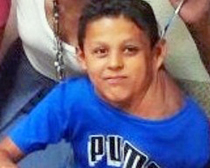TOP STORY: HSI helps 9-year-old seek medical treatment in US
As soon as Denise Gutierrez, a U.S. Immigration and Customs Enforcement (ICE) Homeland Security Investigations (HSI) victim assistance coordinator, laid eyes on pictures of 9-year-old José, she knew something had to be done.
José has had a large growth on his shoulder and neck since birth. Unfortunately, the growth continues to increase in size drastically and is beginning to affect both his eyesight and dental health. If the growth is left untreated, it will eventually spread to his heart. José's parents had repeatedly sought help from doctors in Mexico and El Paso, Texas, but they were always turned away and told nothing could be done.
José and his family live in Anapra, an impoverished and turbulent neighborhood in the Mexican border city of Juarez. Living conditions in Anapra are bleak. José's family has no electricity or running water, and there is no access to basic health care.
Church members in Rio Rancho, New Mexico, were participating in missionary work in Juarez when they first met José. They fell in love with José's spirit and kindness and felt compelled to find a way to help him. They reached out to Gutierrez, hoping that she could find a way to assist José.
"This little boy needed help, and I had to help," said Gutierrez. "I didn't know how I was going to help, but I needed to."
Gutierrez presented the pictures and explained José's story to HSI New Mexico Assistant Special Agent in Charge Kevin Abar, who immediately began planning a way for José to come to the United States for treatment. Abar worked with HSI El Paso, HSI Juarez and HSI's Office of International Affairs, as well as other federal agencies to coordinate José and his parents' entrance into the United States. U.S Customs and Border Protection granted José and his parents humanitarian parole after conducting the necessary background checks. Humanitarian parole is used to bring someone into the United States for a temporary period of time due to a compelling emergency.
The family's humanitarian parole lasts for 45 days. The cost of their stay in the country and the medical bills are covered by the church in Rio Rancho that first found José. During this initial stay, José will see a dentist, an ophthalmologist and other specialists. While 45 days is not enough to cure José, Gutierrez is optimistic.
"It's a step in the right direction," she says. "José will hopefully get a diagnosis within these 45 days."
Both Gutierrez and Abar agree that helping José is the right thing to do and that this young boy's situation transcends physical borders.


